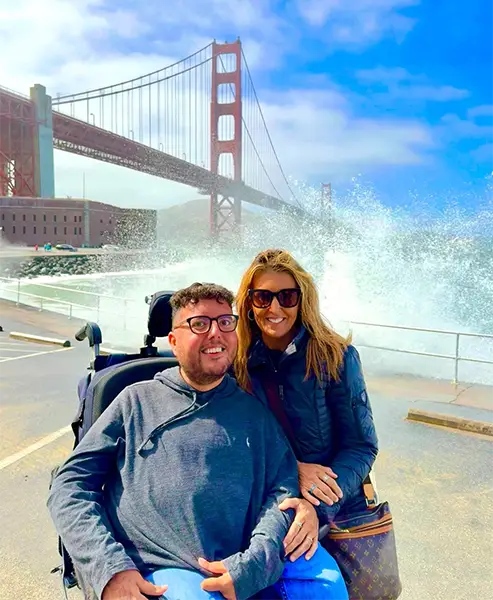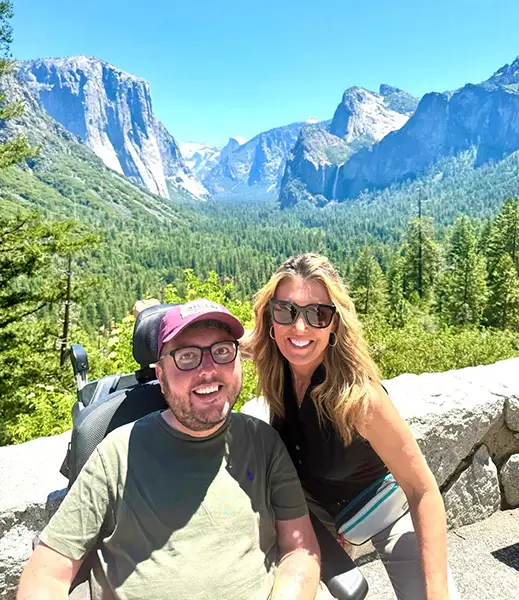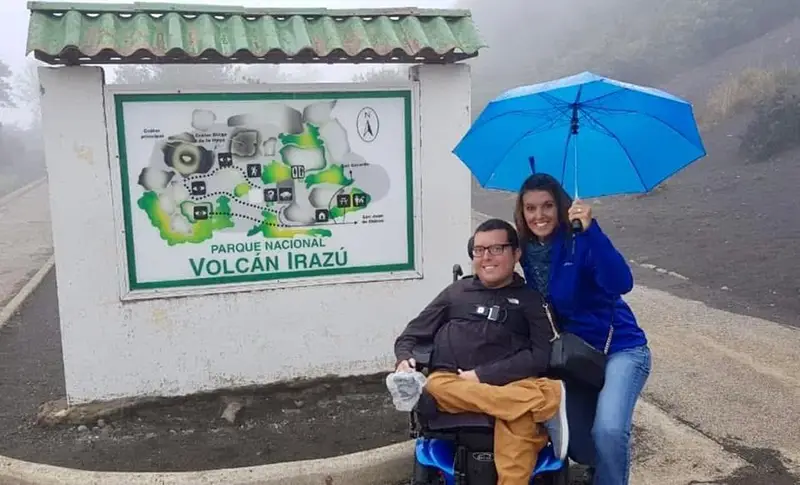Let's face it: travel is always full of unplanned events. But when you are caring for someone who uses a wheelchair, things can become even more eventful. The worries and what-ifs increase, and your stress levels heighten from fear of something going wrong. Not every second of travel can be planned, but there are steps that you can take to make it more enjoyable. After traveling across 52 countries with my son, who uses a power wheelchair, I've learned a few helpful strategies. Let's get started with some tips, so that you can lay that lounge chair back and relax in peace once you arrive at your destination.
Start planning in advance and make a list!
The more time that you have to plan for your trip, the more you will be prepared. I always start by making a list of items that I don't want to forget. I look over the itinerary if it's planned, or if not, I think about what all activities that we will want to participate in. Of course, medications are at the top of the list, with clothes and shoes next, sunscreen, toiletries, and favorite snacks.

I also add items to my list that will be needed in case something goes wrong. I like to pack zip ties, duct tape, and a long double-sided roll of Velcro for those emergency situations. For example, I've used zip ties to hold my son's arm rest on his wheelchair after it was damaged by an airline. I've used duct tape to make a ramp over a threshold in the shower after rolling it around some towels, and the Velcro is handy for an extra seat belt when necessary to provide extra security for my son.
Get lots of fresh air and exercise
Staying cooped up inside a hotel room can take a toll on your mental state. You may have a window view, but when there isn't a balcony to take in the fresh air, make time to go outside. Feel the sunshine on your face, breathe in the fresh air, and go for a walk around the block. Just taking a few moments for yourself can be very rewarding. Most hotels offer a gym to their guests, so even a quick walk on the treadmill would get your endorphins pumping as well.
Get plenty of rest and hydration
If you're worn down, tired, and sleepy, no one will have a good day, especially the person you are caring for. Drinking plenty of water and getting in bed as quickly as you can after assisting your loved one to bed will be very beneficial. Also, taking breaks throughout the day will give you a bit of respite. Take advantage of those park benches when you walk past one. Sometimes, just a quick five-minute rest or nap will do the trick for some rejuvenation.
Make every effort to eat healthy foods
The old saying is right: we are what we eat. If we eat junk, we feel sluggish, and if we eat healthy, our bodies and stamina will thank us for it. I am definitely not the healthiest of eaters, but I do know how to listen to my body. Your body will let you know when it is hungry, and I try to listen to it and only eat at those times. Choosing an apple instead of a bag of chips, or a side of Brussels sprouts instead of fries with that meal could make a world of difference.

our bodies need a good balance of proteins, fruits, and vegetables. A boiled egg for breakfast can give us an energy boost, and choosing a fruit or veggie smoothie is a great way to start your day. I'm liable to grab a quick, sweet snack, so I understand how easy that is. But by getting a handful of almonds, or a granola bar, or a box of raisins when traveling, I will have more energy for a longer period of time. And as caregivers, that is exactly what we need!
Voice your needs
It is so important to sit down and talk to the person who you are providing care for, if they are able, and discuss your needs as well as theirs. Often, caregivers get so caught up in the needs of their loved one, that they forget about their own needs. Make it a point to talk to one another and discuss what it is that keeps you motivated and happy. Whether you would like a small break to do an outdoor walk during your trip or a few minutes alone to meditate, look at your phone, or whatever it is that gives you peace and happiness, let your needs be known.
Being straightforward and discussing your needs will save disagreements and disappointment later. Both you and your loved one will realize what it is that makes you who you are, and with respect for one another, you can build a successful relationship.
Listen more than you speak
This one is hard for a lot of people. Listening more than we speak will honestly give us the knowledge that we need to care for our loved one in a way that is desired. Listening to someone is a skill that requires patience and an empathetic spirit. You can really learn a lot about a person by listening to their stories and their wants & needs without interrupting them.

Remember that you don't always have to have a story that compares to theirs and you don't always have to tell everything that you've ever done. Ask your questions and actually listen to their responses. Give them time to elaborate before you interject with your response. By listening during a trip, you will learn more and be able to retain more of the information.
Complete vehicle maintenance
Always, always, always make sure to complete vehicle maintenance prior to going on a trip. Whether you will be driving to the airport or going on a road trip, the vehicle should be well maintained and in working order. No one wants to miss their flight due to an overheating engine, and no one wants to have to stop for gas on the way to catch their flight. With time ticking away, doing things such as checking tire pressures, making sure your engine has oil and fuel, making sure your windshield wipers are in good shape in case of rain, and checking the tire tread depth can save you tons of time by doing them before your trip.
Call the airline directly if flying
If you're flying with someone who uses a wheelchair, always call the airline directly before the day of your flight. Make the worker aware that your companion will be flying with a wheelchair, as they may want to know the dimensions and weight of the wheelchair to better prepare themselves. If you are not sure of the height, width, or weight of the wheelchair, you should be able to call the wheelchair supplier to gather the necessary answers prior to calling the airline.

Often, the airline will ask if the person using the wheelchair is able to transfer on their own, or if they will need assistance with transferring to the plane seat. By calling in advance, the airline can have the staff in place to assist where needed.
Check for needed wheelchair repairs
Although it has happened to the best of us, no one wants to spend their time on vacation at the wheelchair repair shop. Before your trip, look over the wheelchair and check for any loose screws to make sure that they are tightened. Look at the tires to see if they need to be replaced to prevent sliding in unfamiliar terrain, and make sure to give the chair a complete charge prior to the travel day if it has a battery.
Make sure to pack wisely
Packing for a trip as a caregiver can be overwhelming. There are so many items to remember for both yourself and your loved one that i can be almost nerve-wracking. But by preparing a list a head of the trip, you can add or remove items as the days go by during the planning process. This will ensure that nothing needed is forgotten.
Also, keep in mind that you will possibly be the one who will be carrying the luggage, so think about the weight. You don't want to overpack unnecessary items, and end up hurting your shoulder or back trying to carry it all. Only pack a minimum amount of clothing with layers in mind depending on the weather at the destination. If packed correctly, an eight-day trip shouldn't require eight pairs of pants. It is okay to mix and match, and re-wear clothes to save the trouble of dragging around overweight luggage.
Keep comfort at the forefront
Caregiving during travel will require you to maneuver a lot, even more so than at home. You will be in unfamiliar hotels and destinations, and you may need to rearrange the furnishings in the room, or to walk a little further looking for ramps and curb cuts. Dress accordingly! You don't want to be worried about twisting an ankle in high heeled shoes or walking too far because your pants are riding up or may be a little too tight.
Comfort during travel is very important, and being a caregiver that is comfortable will make you so much more pleasant to be around. I've tried to dress up during a trip way too many times and been disgruntled over aching feet or an uncomfortable shirt, so trust me when I say it's not worth it! Just be you and feel good, and everything else will fall into place.

The most important thing with travel is to have fun! Go with the flow and take whatever is thrown at you with a positive stride. Travel can be such a rewarding experience for both yourself and the person for whom you are providing care. Always know that things can go wrong, so try to prepare yourself as best as you can, but remain patient and think about a solution before getting upset. Remember, there are no problems, only "issues" that need resolving! Get out there and see this amazing world together. Just don't forget to pack your patience, kindness, and willingness to explore a new destination.
About the author
Sandy Gilbreath is a world traveler, social media influencer, and a Georgia native. She is a single mother to the award-winning travel blogger Cory of Curb Free with Cory Lee. She is the co-author of the children's book "Let's Explore with Cor-Cor" and serves on the Board of The Curb Free Foundation, a non-profit organization that awards travel grants to people who use wheelchairs. Follow her travels on her Facebook page, My Sandy Trail.
Most of the stories here on LiveQuickie.com were submitted by readers. Do you have a story to tell? We'd love to hear it. Submit your story here.